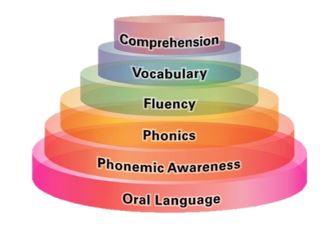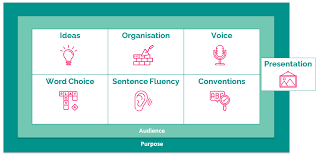Literacy at Vermont Primary School
At Vermont Primary School, we are proud to offer a comprehensive Literacy program that caters to the needs of all learners. Our approach is grounded in evidence-based practices aligned with the Science of Reading, and reflecting the Victorian Teaching and Learning Model 2.0. We are committed to equipping our students with the Literacy skills and strategies they need for success in their future schooling, careers, and everyday life.

Reading and Viewing
At VPS, reading is taught using a structured, evidence-based approach that is developmentally sequenced from Foundation to Year 6. Central to our approach is the understanding that the Big 6 Components of Reading: oral language, phonological awareness, phonics, fluency, vocabulary, and comprehension underpin all reading instruction. Reading is a complex process that involves both learning to decode texts and learning to make meaning from texts.
In the early years, our focus is on building strong foundational skills in reading. We use the Read Write Inc. program to offer a structured and systematic approach to teaching literacy. Our students have access to high-quality decodable readers and books matched to their learning needs.

In the Middle and Upper years, they participate in a dedicated Literacy Block. This block incorporates the explicit teaching of essential literacy skills, including building reading fluency, developing reading accuracy, expanding vocabulary, and strengthening comprehension strategies.
At Vermont Primary School, we are committed to developing skilled, engaged, and thoughtful readers.
Writing
At VPS, we understand that effective writing involves mastering the craft of writing which include: ideas, organisation, voice, word choice, sentence fluency, conventions, and presentation. These traits are aligned with the principles of the 6+1 Traits of Writing.

Importantly, we also believe that writing should be an enjoyable and creative process. We strive to foster a love of writing by encouraging students to express themselves and develop their creative thinking. By combining skill development with opportunities for self-expression, we aim to equip students not only with the ability to write well, but also with the passion and confidence to continue writing throughout their lives.
Spelling and Grammar
Research shows that spelling and grammar require explicit, systematic, and repeated instruction in order to be effectively learned. At VPS, we prioritise this through regular, dedicated spelling and grammar sessions timetabled across all year levels.
Our program is developmentally sequenced and addresses the following key components:
Phonemic Awareness, Phonics and Phonology, spelling conventions, grammar and punctuation, morphology and etymology.
From Foundation to Year 2, spelling and grammar instruction is embedded within our Read Write Inc. lessons. This approach focuses on building strong foundational skills, particularly in phonics, phonology, and early grammar and punctuation.
In Years 3 to 5 participate in the Spelling Mastery program, a systematic approach designed to extend and consolidate their spelling knowledge. Grammar and punctuation skills are taught separately, through a structured sequence aligned with the Victorian Curriculum 2.0, ensuring consistent progression across year levels.
In Year 6, students are further challenged as they explore more advanced aspects of spelling and language. They build a deeper understanding of etymology and morphology and refine their grammar and punctuation through targeted instruction.
Speaking and Listening
Through Literacy lessons at VPS, students learn to express themselves clearly, listen respectfully, and communicate effectively with others. From Foundation to Year 6, students engage in a range of formal and informal oral language activities, including:
- Class discussions
- Group projects and presentations
- Partner and small-group conversations
- Performances and speaking opportunities
Students are explicitly taught how to use body language, vocal tone, and active listening strategies. They learn how to adapt their speech for different audiences, purposes, and contexts. These experiences help build confidence and equip students to become articulate, thoughtful, and effective communicators.
Refer to the Victorian Curriculum F-10 Version 2.0 – English Version 2.0 for details.
